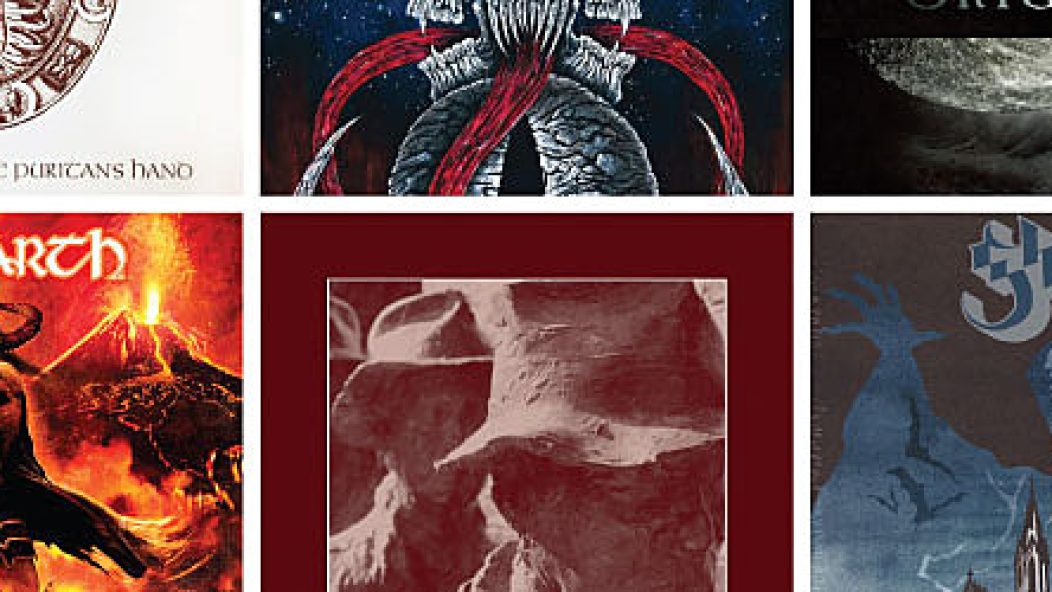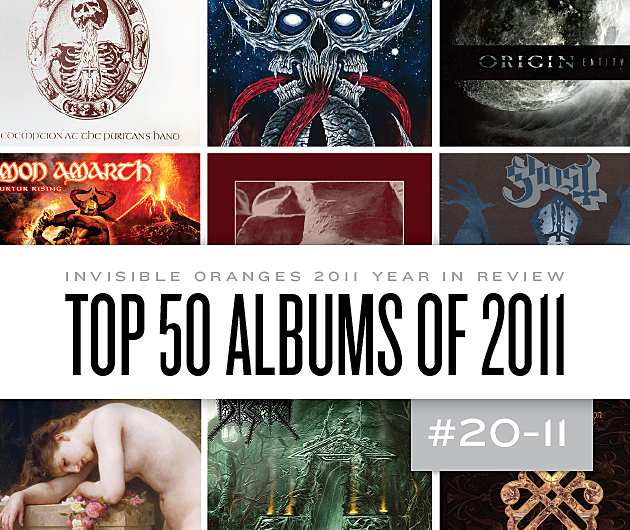
Top 50 Metal Albums of 2011, 20 to 11
. . .
For an explanation of how we determined our Top 50 albums of 2011 (and for a look at albums 75 to 51), see our first post in the series, Top Albums of 2011, 75 to 51.
20. Inquisition – Ominous Doctrines of The Perpetual Mystical Macrocosm (Hells Headbangers, USA)
Precious few bands that claim to invoke Satan or ancient Pagan deities through their music actually live up to the boast. Inquisition claims, and Inquisition succeeds. Ominous channeled the majestic, the arcane, and the vast through big bold melodies and Dagon’s unmistakable croak. I see Inquisition as travelers on a path leading outside our mundane realm, and each album a missive to mere mortals. Technically, Ominous was a late 2010 release, but it’s worth celebrating again. As far as I’m concerned, it’s better than any black metal album released in 2011.—Richard Street-Jammer
. . .
http://www.youtube.com/watch?v=oGiU3pplUGU
Inquisition – “Ominous Doctrines of The Perpetual Mystical Macrocosm”
. . .
Read the Invisible Oranges review of Inquisition’s Ominous Doctrines.
19. Burzum – Fallen (Byelobog, Norway)
Yes, yes, along with being the most influential figure in black metal history, Varg Vikernes is still a reprehensible bigot who espouses his hate with the slightest provocation. And 2011 was a busy year for The Count: He released Fallen–a totally essential inclusion in the Burzum canon–he re-recorded and released some of Burzum’s early work–a totally inessential inclusion–and he wrote a paranoid, antisemitic, 800-word rant in late July, when an extreme-right-wing Norwegian psychopath killed 77 of his countrymen and injured 151 more. It’s not related to the music, no, but it was published on the Burzum website, ostensibly a place for fans to find information on the musical act Burzum, so…ugh. So much for a kinder, cuddlier Varg. But the art cannot be denied. Post-prison Varg is producing massively compelling work; Fallen is even better than its predecessor, 2010’s outstanding Belus. Texturally, Fallen is the most diverse Burzum album—incorporating clean vocals here, Metallica riffs there, and crisp, robust production throughout—but it holds firm on those ambient elements essential to Burzum: a gray, enervating despair; a bleak, menacing chill.—Mike Nelson
. . .
Burzum – “Jeg Faller”
. . .
18. Ghost – Opus Eponymous (Metal Blade, Sweden)
When last did you hear blasphemy crooned? Has evil ever smiled its way into your heart? Croaking and shrieking and burning churches does not grow the Satanic flock like a wink and a catchy tune. If Satan actually tried using rock and roll to steal hearts, Opus Eponymous would at least give him a Ghost of a chance. Some called this pop and pap alike. I don’t care, and I don’t think it matters. Take it away, Langston Hughes, because you said it best:
Cheap little rhymes
A cheap little tune
Are sometimes as dangerous
As a sliver of the moon.
A cheap little tune
To cheap little rhymes
Can cut a man’s
Throat sometimes.
Consider my throat well and truly cut, and Opus Eponymous the knife and altar alike.—Richard Street-Jammer
. . .
Ghost – “Ritual”
. . .
17. Septicflesh – The Great Mass (Season of Mist, Greece)
Many bands try to marry extreme music to symphonic instruments and arrangements, yet the marriage often yields mediocre results. The Great Mass from Grecian death metallers Septicflesh not only brings both sounds together, but does so by using European orchestral music as a blueprint through which the band assembles their metal. Heavy, distorted guitars and thudding bass lie entwined with classical string arrangements and wind instruments, drawing out an ominous flavor from each song that is strong enough to rise into fantastical, epic territory. Due to guitarist Christos Antoniou’s background as a composer with orchestral experience, Septicflesh are able to push their own classical music leanings even further than the previous symphonic sparks shown on their 2008 album, Communion. —K. Ann Sulaiman
. . .
Septicflesh – “The Great Mass of Death”
. . .
Read the Invisible Oranges review of Septicflesh’s Communion, and an interview with Septicflesh.
16. Origin – Entity (Nuclear Blast, USA)
Entity opens with “Expulsion of Fury”, sending the listener down The Descent into Purgatory. Each Origin song is about Conceiving Death, each song Committed to a Swarm of riffs and speed. Many have accused Origin of being Forever incapable of writing a decent song. Entity and Antithesis before it are the answers to that accusation, and the Consequence of these Solutions is the Banishing Illusion that Origin is just endless blastbeats and noise. Obscura wanted to politely show us their chops. Origin needed just 36 minutes to chop us into oblivion. No widdling, no pretty melodies, and no jazz, because Entity is the Evolution of Extinction.—Richard Street-Jammer
. . .
http://www.youtube.com/watch?v=A7dDEiN6OTk
Origin – “Swarm”
. . .
15. Mournful Congregation – The Book of Kings (20 Buck Spin, Australia)
While Australia’s not known as a hotbed of doom, anticipation was high for Mournful Congregation to return to the monolithic form of their earlier work. And when their fourth full-length The Book of Kings finally arrived, the near-80-minute slab of funeral doom released its allure like a poisonous flower. These four songs are 12 to 33 minutes in length, are beautifully crafted, and create a solemn, ritualistic atmosphere. But though immersive, it’s not the length or pace, necessarily, of these songs that’s so appealing. The band’s music emerges in tendrils of whispered vocals, acoustic guitar flourishes, and droning passages. Coupled with a thunderous bottom end, the dynamics of how this all unfolds is gripping through the last second. Mournful Congregation are aware of the accepted blueprint of doom—and funeral doom, especially—yet do it their own way. —Vanessa Salvia
. . .
http://www.youtube.com/watch?v=ZBN6JaGDW_k
Mournful Congregation – “The Bitter Veils of Solemnity”
. . .
Read the Invisible Oranges review of Mournful Congregation’s The Book of Kings.
14. Disma – Towards the Megalith (Profound Lore, USA)
Metal musicians, the riff is your stock and trade; it is the indivisible atom. Disma know this. Without riffs there is no metal. Old-school enthusiasts (see labelmates Antideluvian) focus so utterly on early ’90s aesthetic that they forget this simple fact. Where there are no riffs, there are no songs, and where there are no songs there is nothing. Critics piled compliments onto Craig Pillard and company’s collective shoulders because they wrote actual songs before cocooning them in Marianas Trench distortion. One can easily listen to Towards the Megalith, despite (or because of) its near-glacial pace. In fact, Towards the Megalith might be a better listen than the records that paved its way.—Joseph Schafer
. . .
http://www.youtube.com/watch?v=JyKvEfD7t_w&feature=results_video&playnext=1&list=PLF709FBBD9E711190
Disma – “Lost In the Burial Fog”
. . .
13. Flourishing – The Sum of All Fossils (The Path Less Traveled Records, USA)
The New York City metal scene is populated by numerous bands with no apparent allegiance to genre, but few are quite as hard to pin down as Flourishing. The band’s debut LP, The Sum of All Fossils, was brutal and delicate, grotesque and melodic, fast and slow and everything in between; the only constant elements were the thrills it provided. (Flourishing frontman, Garett Bussanick, also plays guitar in Wetnurse, perhaps the sole metal band in NYC with fewer musical boundaries.) Fossils was a blisteringly hot steel cauldron bubbling over with several decades’ (and countless subgenres’) worth of death metal, grind and industrial, among other influences. But it somehow avoided sounding freakish or Frankensteinian. Er, that is to say it didn’t sound unnatural or patched together; it sounded plenty fucking monstrous. —Mike Nelson
. . .
http://www.youtube.com/watch?v=GJrcrymMOok
Flourishing – “As If I Bathed In Excellence”
. . .
Read the Invisible Oranges review of Flourishing’s A Momentary Sense of the Immediate World.
12. Amon Amarth – Surtur Rising (Metal Blade Records, Sweden)
Nearing their two-decade anniversary, Amon Amarth have built a signature sound that has earned them a spot in the golden hall of metal greats. Surtur Rising had all the elements we’ve come to love: the monumental riffs; the rallying vocals; the welding of catchiness, ferocity, and bright melodies. But it also had more intricate solos and drumming. With a new level of musicality, Amon Amarth went from being prolific to undeniable. The widespread appeal of this record was best seen live, as the band whipped through it night after night on their extensive, sold-out tours, with such purpose, as though each show was as crucial as the battles about which they sing. Yes, songs about swords and Odin still sound pretty damn good. —Julia Neuman
. . .
Amon Amarth – “War Of the Gods”
. . .
Read the Invisible Oranges review of Amon Amarth’s Surtur Rising.
11. Primordial – Redemption At the Puritan’s Hand (Metal Blade, Ireland)
I’m gonna go ahead and agree with IO’s K. Ann Sulaiman here and say that Primordial have released no bad albums. A stew of black metal, doom metal, and Celtic folk themes is alchemically transformed via Alan Averill’s inimitable voice and haunting melodies into something uniquely compelling. Redemption saw Primordial turn from historical drama to mortality, focusing their already formidable songwriting and storytelling skills on the more personal realm. The melodies were some of the most powerful they’ve done so far, and every aching howl from Nemtheanga could not fail to demand response from the listener. Complex and increasingly interesting with every listen, Primordial have written perhaps their strongest album yet–easily one of the best of the year. —Tim Hunter
. . .
http://www.youtube.com/watch?v=DcMCbOW7u1k
Primordial – “No Grave Deep Enough”
. . .
Read the Invisible Oranges review of Primordial’s Redemption At the Puritan’s Hand.











